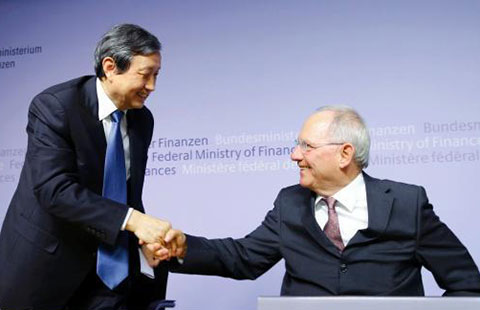Rizhao aims for leading role in oil trade
By LI XIANG (China Daily) Updated: 2015-03-11 09:46Rizhao Port in the eastern province of Shandong aims to become the country's largest terminal for crude oil imports, and a key participant in the nation's energy security drive, by expanding and bringing in strategic investors.
The National Development and Reform Commission, the top economic planner, has approved the construction of berthing facilities costing 1.2 billion yuan ($192 million) that can handle 17.5 million metric tons of crude oil annually.
It will be the port's third crude oil facility that can dock tankers with a capacity of 300,000 deadweight tons. The NDRC will likely approve a fourth one soon, Du Chuanzhi, president of Rizhao Port Co Ltd, said on Monday.
Those two facilities will boost the port's annual imports of crude oil to about 100 million tons, roughly one-third of China's total, making it the country's largest receiver of crude oil, according to Du.
Crude imports at Rizhao exceeded 32 million tons last year, about 10 percent of the country's total.
The development at Rizhao Port is viewed as part of China's strategy to increase oil imports and expand strategic inventories at a time when global crude prices are in the doldrums.
Du said that the port plans to invest up to 10 billion yuan on upgrading and modernization as it deals with the pressure of slower economic growth and intense competition among the country's major ports.
The State-owned port hopes to raise funds for its ambitious expansion plan through public-private partnerships and the introduction of strategic investors, with preference given to large financial institutions and giant shipping groups.
Crude imports will grow steadily, even though China has lowered its foreign trade growth target to about 6 percent this year, analysts said.
"Policies at the national level will also help boost the port industry, which has been struggling amid the global economic downturn," Guotai Junan Securities Co Ltd said in a research note.
Du said the port will benefit from initiatives to revive the land-based and maritime economic Silk Roads as the port is linked by major railways with countries including Mongolia, Russia and those in Central Asia that are seeking new trade routes.
Du said that slower trade growth will lead to intensified competition among ports, which will in turn mean mergers and acquisitions in the industry in the next five years.
"Although we haven't taken any action yet, we intend to form alliances with other major ports," he said.
While maintaining its strength in handling iron ore, Du said the port will focus on its fast-growing crude import business, taking advantage of its strategic position in the country's energy logistics chain for energy supplies to the central and western provinces.
- Israel requests to join Asian Infrastructure Investment Bank
- Chinese stocks rebound on April 1
- China, the West in Africa: more room for cooperation than competition
- Nanjing cuts taxi franchise fees
- Air China increases flights to Milan, Paris
- JD.com raises delivery charges
- Veteran corporate strategist upbeat about China economy
- L'Oreal China sales revenue up 7.7% in 2014

















